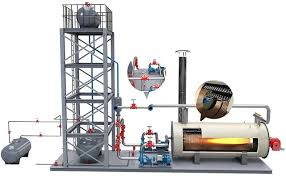
Дек . 17, 2024 16:47 Back to list
Understanding the Pressure Levels in Hot Water Boiler Systems for Optimal Performance
Understanding Hot Water Boiler PSI A Comprehensive Guide
Hot water boilers are essential components of heating systems used in residential and commercial settings. They provide a reliable and efficient means of heating water, which can then be circulated throughout a building for space heating or other applications. One key aspect of hot water boiler operation that often goes overlooked is the PSI, or pounds per square inch, a vital measure of pressure that affects the boiler’s efficiency and safety.
What is PSI in the Context of Hot Water Boilers?
PSI is a unit of pressure that measures the force exerted by a gas or liquid per unit area. In hot water boilers, PSI refers specifically to the pressure of the water in the system. The pressure in these boilers must be maintained within a specific range for optimal operation. Typically, hot water boilers operate within a pressure range of 12 to 30 PSI.
Maintaining the correct PSI is crucial as it can directly impact the performance of the boiler. If the pressure is too low, the boiler will not be able to effectively circulate hot water throughout the system. Conversely, if the pressure is too high, there is a risk of damage to the boiler and the entire heating system, which can pose serious safety hazards.
How to Measure and Control Boiler PSI
Most modern hot water boilers come equipped with a pressure gauge that allows operators to monitor the PSI. This gauge is typically located on the front panel of the boiler, providing a clear and immediate reading of the system's pressure.
hot water boiler psi

If the PSI falls below the recommended level, it may indicate that the system is low on water. In this case, it is essential to add water to the system until the appropriate pressure is reached. This can often be accomplished by opening a valve on the boiler or through a manual fill method. It’s important to refer to the manufacturer’s instructions when adding water to avoid overpressurizing the system.
On the other hand, if the PSI reading is excessively high, it could be due to a malfunctioning pressure relief valve or excessive water in the system. In such cases, it may be necessary to bleed the radiators or even address leaks in the heating system taking care not to release too much water at once, as this can lead to further pressure fluctuations.
Signs of Pressure Issues in Hot Water Boilers
There are several signs that could indicate problems with the boiler's PSI. If you notice unusual noises coming from the boiler — such as banging or whistling — it may suggest that the pressure is too high or too low. Another sign of a potential pressure issue is water leaks around the boiler or radiators, which can occur when the system is overpressurized. Regular maintenance of the boiler, including checking the pressure gauge, is essential to prevent these issues from escalating.
Safety Precautions
Safety should always be a top priority when working with hot water boilers. If you suspect that the boiler's PSI is excessively high or low, it is best to consult a qualified technician. Failure to address pressure issues can lead to dangerous situations, including boiler explosions or carbon monoxide leaks.
In conclusion, understanding hot water boiler PSI is vital for maintaining an efficient and safe heating system. Regular monitoring, proper maintenance, and prompt action when issues arise can ensure the longevity of the boiler and the comfort of your space. By prioritizing these aspects, you can keep your heating system running smoothly and efficiently.
-
How to Maintain a Steam Boiler Expert Tips for Efficiency & Longevity
NewsApr.29,2025
-
Professional Steam Boiler Service AB Expert Maintenance & Repair
NewsApr.29,2025
-
Hot Water Steam Boilers Efficient Heating Solutions & Expert Tips
NewsApr.29,2025
-
Hot Water Boiler Capacity Calculation Guide Efficient Design Tips
NewsApr.28,2025
-
How to Drain a Steam Boiler Step-by-Step Safety Guide
NewsApr.28,2025
-
How to Install a Hot Water Boiler Optimal Pressure & Efficiency Guide
NewsApr.28,2025
Related PRODUCTS






















